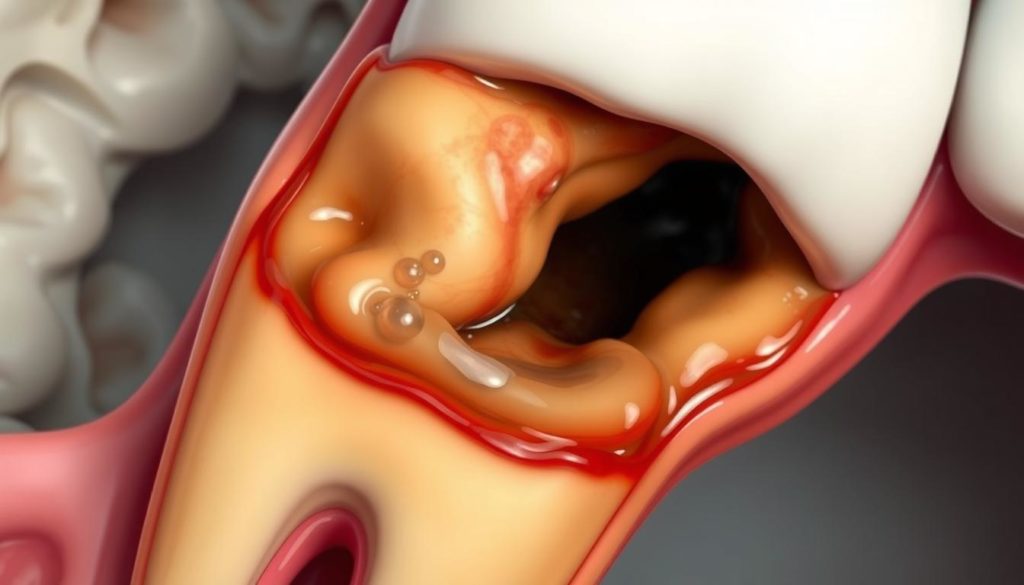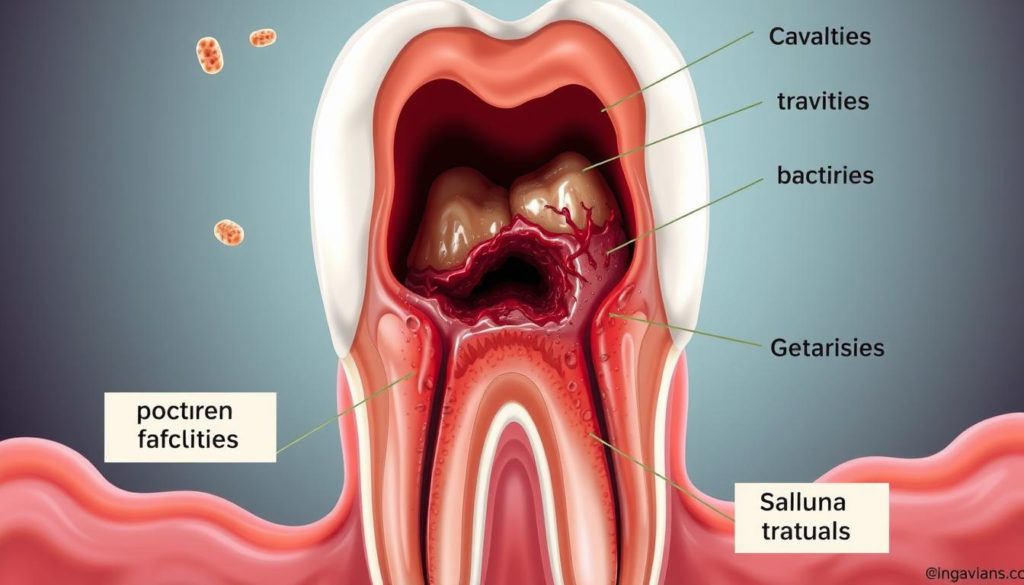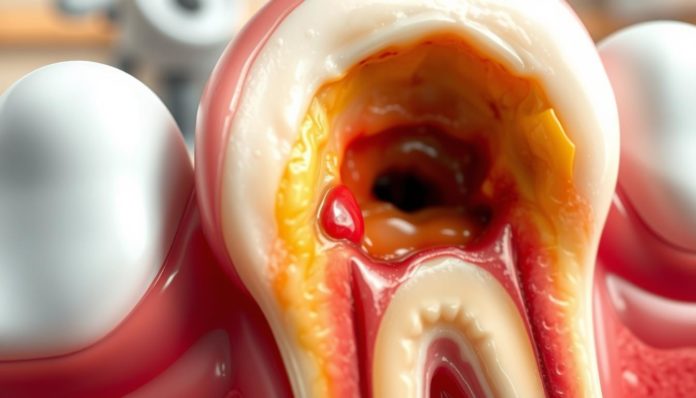Did you know nearly 90% of Americans over 20 have had a cavity? Cavities can turn into severe tooth infections like an abscessed tooth. It’s important to know how to prevent dental emergencies and manage tooth pain.
An abscessed tooth is more than just a toothache. It’s a serious condition that needs quick attention. Causes include bacterial infections and poor oral hygiene. But, there are treatments like antibiotics, root canals, and tooth extractions that can help.
Learn how to spot the signs of a dental abscess. Find ways to ease the pain quickly. And, find out how to keep your mouth healthy to avoid future problems.
Understanding an Abscessed Tooth
An abscessed tooth happens when a pocket of pus forms in the tooth or gum. This is due to a bacterial infection. It can be very painful and lead to serious problems if not treated quickly.

Definition and Symptoms
A *dental abscess* is a painful, swollen area filled with pus. The main symptoms of an abscessed tooth are intense toothache, sensitivity to hot and cold, swollen gums, and fever. If it bursts, you might taste something bad or see foul-smelling fluid.
Why an Abscess Forms
The main *causes of tooth abscess* are untreated cavities, gum disease, or a cracked tooth. These let bacteria get deeper into the tooth or gum. Bad *oral health* habits, like not brushing or flossing well, make these problems worse. Getting dental care fast is key to handling these issues and keeping your mouth healthy.
Common Causes of Abscessed Teeth
Abscessed teeth are a serious dental issue. They can come from several problems. Knowing what causes them is key to good oral hygiene and avoiding big dental problems.

Bacterial Infections
Bacteria are a main cause of tooth infections. They get into the tooth through cracks or cavities. This leads to an infection and an abscess. It’s important to stop bacterial growth early to keep your teeth healthy.
Poor Oral Hygiene
Not brushing and flossing well can lead to abscessed teeth. Plaque, which holds bacteria, builds up. This can cause tooth decay and gum disease. Keeping up with oral hygiene is crucial.
Tooth Decay and Damage
Tooth decay and damage also cause infections. Decay weakens teeth, making them easy targets for bacteria. Cracks and chips let bacteria into the pulp, causing abscesses. Taking care of your teeth and fixing damage quickly can prevent these problems.
| Cause | Description | Prevention |
|---|---|---|
| Bacterial Infections | Infiltration of bacteria into the dental pulp leading to infection. | Prompt treatment of cavities and cracks. |
| Poor Oral Hygiene | Inadequate brushing and flossing leading to plaque buildup and bacterial growth. | Maintaining consistent brushing and flossing routines. |
| Tooth Decay and Damage | Weakening of tooth structure and exposure of dental pulp due to decay or physical damage. | Regular dental check-ups and repairing dental damage promptly. |
Recognizing the Symptoms of an Abscessed Tooth
Knowing the abscessed tooth symptoms is key for early treatment. A common sign is a toothache that won’t stop. This pain gets worse when you lie down, making it hard to sleep.
Another sign is swollen gums near the tooth. This swelling hurts and makes chewing hard. Sometimes, the area can burst, releasing foul-tasting fluid or pus.
Bad breath or an unpleasant taste can also mean an abscess. You might also feel pain when eating hot or cold foods, making the toothache worse.
In serious cases, symptoms can spread beyond the mouth. You might have a fever, swollen lymph nodes under your jaw or neck, and feel generally unwell.
Here’s a quick guide to common abscessed tooth symptoms:
| Symptom | Description |
|---|---|
| Toothache | Persistent, throbbing pain |
| Swollen Gums | Gums around the affected tooth are swollen and painful |
| Sensitivity | Increased sensitivity to hot or cold |
| Bad Breath | Persistent bad breath or foul taste |
| Fever | Elevated body temperature |
| Swollen Lymph Nodes | Swelling under the jaw or in the neck |
Spotting these symptoms early can lead to quick dental care. This can prevent bigger problems and keep your mouth healthy. Always check your oral hygiene and see a dentist if you notice any of these signs.
Immediate Relief for Abscessed Tooth Pain
Tooth pain from an abscess can be very painful. It’s important to know how to find relief and when to see a dentist. This section will give you all the details you need.
Over-the-Counter Pain Relievers
For quick relief, try over-the-counter pain meds like ibuprofen or acetaminophen. These drugs cut down swelling and ease pain. They give you temporary relief until you can see a dentist.
Home Remedies and Care
While waiting for a dentist, some home remedies can help. Rinse your mouth with warm salt water to clean and reduce bacteria. Also, a cold compress on the swollen area can help with pain and swelling.
When to Seek Professional Help
If you have severe swelling, trouble breathing, or swallowing, get emergency dental care right away. If the pain doesn’t go away or gets worse, you need a dentist’s help.
The Risk of Untreated Abscessed Teeth
It’s key to know the risks of untreated tooth abscess for your health. Not treating an abscess can turn a small problem into a dental emergency with big consequences.
An untreated abscess can spread the oral infection beyond the tooth. This might cause:
- Swelling in the jaw, neck, or around the tooth.
- Hard time breathing or swallowing.
- Infection that affects other parts of the body.
Also, an oral infection can weaken your immune system. This makes it harder for your body to fight off other infections. The bacteria from the abscess can get into your blood, causing sepsis—a serious condition that can be deadly if not treated fast.
Here’s how treated and untreated tooth abscesses compare:
| Condition | With Treatment | Without Treatment |
|---|---|---|
| Infection Control | Kept in one place and managed | Spreads to other parts of the body |
| Pain Levels | Greatly reduced | Keeps getting worse |
| Overall Health | Gets better and stays stable | Can lead to serious and life-threatening problems |
The dangers of not treating a tooth abscess show why you should see a dentist quickly. If you think you have an abscess, get it treated right away to avoid a bigger dental problem.
Don’t wait; take care of your health by acting fast on any signs of an abscessed tooth. Your health depends on quick dental care and handling any oral infection right away.
Available Treatment Options for Dental Abscess
Knowing your treatment options for a dental abscess is crucial. Quick and effective treatment can save your teeth and ease pain. Here are the top treatments recommended by dentists:
Root Canal Treatment
A root canal is a common fix for dental abscesses. It involves removing the infected pulp, cleaning the tooth, and sealing it. This way, you can keep your natural tooth and stay healthy.
Despite what you might think, root canals are quick and not very painful. Modern dental methods make it easier.
Tooth Extraction
If your tooth is too damaged or infected, a root canal might not work. In such cases, you might need to have the tooth pulled. This stops the infection from spreading and keeps your mouth healthy.
After pulling the tooth, your dentist might talk about getting a dental implant or bridge. This helps keep your teeth in line.
Antibiotic Therapy
Antibiotics are key in treating dental abscesses, especially if the infection has spread. They can’t cure the abscess alone but help make other treatments more effective. Your dentist will choose the right antibiotics for you based on the infection’s severity and your health history.
Understanding these options helps you make better choices. Seeking timely dental abscess treatment improves your oral health and prevents future problems.
Preventing Future Abscessed Teeth
Keeping your teeth and gums healthy is key to avoiding tooth abscess. A good dental care routine is crucial. Here are some easy tips to help:
- Brush your teeth at least twice a day with fluoride toothpaste to fight plaque and decay.
- Floss every day to get rid of food and plaque between your teeth and under the gums.
- Use an antibacterial mouthwash to keep harmful bacteria away and prevent infections.
- Eat a balanced diet, avoiding too much sugar to prevent tooth decay.
- Go to the dentist for check-ups and cleanings at least twice a year.
- Think about dental sealants and fluoride treatments, especially for kids, to protect against cavities.
Following these oral hygiene tips can greatly lower your risk of dental problems. Keeping up with your dental care is essential. It helps prevent tooth abscess and keeps your smile healthy and pain-free.
| Oral Hygiene Tips | Benefits |
|---|---|
| Brushing Twice Daily | Removes plaque, prevents decay |
| Flossing Daily | Clears food particles and plaque |
| Using Mouthwash | Kills harmful bacteria |
| Balanced Diet | Reduces risk of tooth decay |
| Regular Dental Check-ups | Early detection and treatment of issues |
| Sealants & Fluoride Treatments | Extra protection for children |
When to Consult an Emergency Dentist
It’s important to know when to seek dental help to avoid serious problems. If you have abscessed tooth symptoms, it’s a sign you need to see an emergency dentist fast. This can stop things from getting worse.
Here are some situations where you should see an emergency dentist right away:
- If you have pain that doesn’t go away with common pain meds.
- Swelling in your face or cheek means you might have a serious infection.
- Having trouble breathing or swallowing is a big warning sign that needs quick action.
- A fever that lasts with dental pain means the infection is getting worse.
Spotting these signs early and knowing when to seek dental help can really help your health. Here’s a quick guide to help you understand:
| Condition | Recommended Action |
|---|---|
| Severe Pain | See an emergency dentist right away. |
| Abscessed Tooth Symptoms | Get to urgent dental care fast. |
| Facial Swelling | Go to an emergency dentist immediately. |
| Difficulty Swallowing | See an emergency expert quickly. |
Knowing these signs helps you decide when to go to an emergency dentist. It’s a step to protect your health.
The Connection Between Tooth Decay and Abscessed Teeth
It’s key to know how tooth decay and abscessed teeth are connected for good dental health. If you don’t treat tooth decay, it can cause serious problems like abscesses.
How Decay Leads to Abscess Formation
Tooth decay happens when plaque eats away at the enamel, making cavities. If you don’t fix these cavities fast, bacteria can get into the tooth. This can lead to an abscess, a painful pocket of pus that causes swelling.
Preventive Measures for Tooth Decay
Stopping tooth decay is key to avoiding abscesses and keeping your dental health in check. Here are some steps to help:
- Brush and floss every day to get rid of plaque and stop dental caries.
- Eat less sugary foods and drinks to stop harmful bacteria from growing.
- Go to the dentist often for check-ups and cleanings.
- Think about getting dental sealants and fluoride treatments for extra protection.
| Preventive Measure | Benefit |
|---|---|
| Daily Brushing and Flossing | Removes plaque, reducing the risk of cavities and dental caries. |
| Reduced Sugar Intake | Limits the growth of decay-causing bacteria. |
| Regular Dental Check-ups | Early detection and treatment of cavities to prevent abscesses. |
| Dental Sealants and Fluoride | Provides an extra layer of protection against tooth decay. |
Importance of Maintaining Oral Health
Keeping your mouth healthy is key for a bright smile and overall health. Good oral hygiene helps prevent dental problems like abscessed teeth, cavities, and gum disease. By brushing, flossing, and visiting the dentist regularly, you can keep your teeth and gums healthy for life.
Daily Dental Care Tips
Brushing your teeth twice a day with fluoride toothpaste is the first step. Don’t forget to floss daily to clean between your teeth. Adding mouthwash to your routine helps reach areas brushing and flossing miss. Eating less sugary foods and drinks also helps prevent cavities, keeping your mouth healthy.
Role of Regular Dental Check-ups
Regular dental visits are crucial for catching problems early. Dentists can spot tooth decay, gum disease, and other issues during these visits. This allows for quick action. Cleanings remove tartar, and your dentist can give you tips to improve your oral care routine.
Make sure to visit your dentist at least twice a year. This helps avoid serious problems like abscessed teeth and keeps your mouth healthy.
FAQ
What causes an abscessed tooth?
An abscessed tooth usually comes from bacterial infections. These infections can get into the dental pulp and tissues around it. Poor oral hygiene, tooth decay, and damage to the tooth are common causes too.
What are the symptoms of an abscessed tooth?
Signs of an abscessed tooth include severe pain and swollen gums. You might also feel sensitivity to hot and cold, have bad breath, and sometimes a fever. If you notice these symptoms, see a dentist right away.
How is an abscessed tooth treated?
Treatment for an abscessed tooth can be a root canal, tooth extraction, or antibiotics. The choice depends on how bad the infection is and the tooth’s condition. Always talk to your dentist about the best treatment.
Can home remedies help with tooth pain from an abscess?
Home remedies like saltwater rinses, pain relievers, and cold compresses can ease pain for a bit. But, they can’t replace professional dental care. If the pain doesn’t go away, see an emergency dentist.
What happens if an abscessed tooth is left untreated?
Leaving an abscessed tooth untreated can cause serious problems. Infections can spread, damage the jawbone, and lead to tooth loss. It’s a dental emergency that needs quick attention.
How can I prevent an abscessed tooth?
To avoid an abscessed tooth, keep your teeth clean by brushing and flossing daily. Regular dental visits and fixing dental problems quickly are also key. Eating less sugar and a healthy diet help too.
When should I consult an emergency dentist for an abscessed tooth?
See an emergency dentist for severe pain, swelling, fever, or any dental abscess signs. Waiting too long can make problems worse and cause more pain.
How are root canals and tooth extractions different?
A root canal removes the infected pulp and seals the tooth to stop infection. A tooth extraction removes the whole tooth. Your dentist will choose the best option for you.
Why is oral hygiene important for preventing tooth abscesses?
Good oral hygiene removes plaque and bacteria that cause decay and infections. It’s crucial for keeping your mouth healthy and preventing abscesses.
What should I do if I suspect I have a dental abscess?
If you think you have a dental abscess, get to a dentist fast. An emergency dentist can diagnose and treat the problem to ease pain and prevent more issues.


